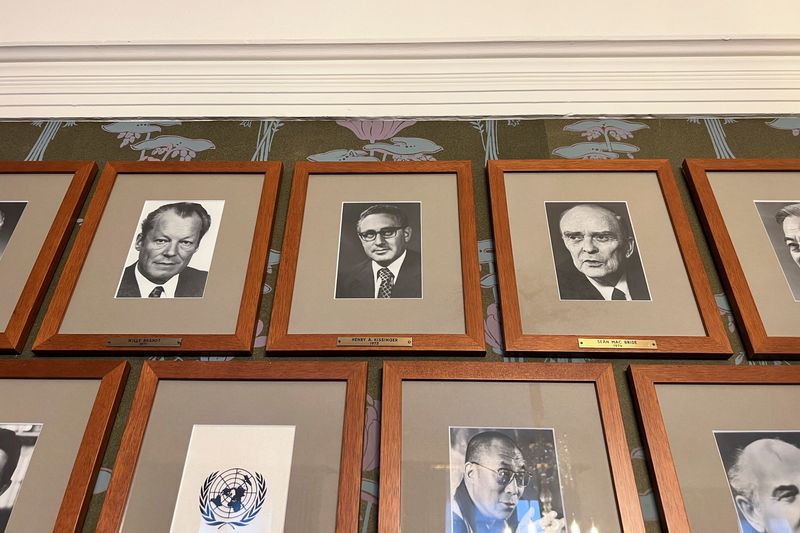By Gwladys Fouche
OSLO (Reuters) - The 1973 Nobel Peace Prize to top U.S. diplomat Henry Kissinger and North Vietnam's Le Duc Tho, among the most disputed in the award's history, was given in the full knowledge the Vietnam War was unlikely to end any time soon, newly released papers show.
Nominations to the Peace Prize remain secret for 50 years. On Jan. 1, documents about the prize awarded to Kissinger and Hanoi's chief negotiator Tho were made available on request.
The decision shocked many at the time as Kissinger, then U.S. national security adviser and secretary of state under President Richard Nixon, played a major role in U.S. military strategy in the final stages of the 1955-75 Vietnam conflict.
"I am even more surprised than I was at the time that the committee could come to such a bad decision," Stein Toennesson, a professor at the Peace Research Institute Oslo who reviewed the documents, told Reuters.
Kissinger and Tho reached the January 1973 Paris Peace Accords under which Washington completed a military withdrawal from South Vietnam after having largely ended offensives and avoided combat against the Communist North in the face of worsening troop morale and huge anti-war protests in America.
But the ceasefire stipulated by the accords was soon ignored on the ground by both North and South Vietnam, which refused to sign the deal claiming betrayal as Hanoi's forces were not required to withdraw from the South.
The war raged on with the North's forces rapidly advancing in the South, now left to fight without critical U.S. support and weakened by high-level state corruption and disarray.
Fighting ended only on April 30, 1975 after North Vietnamese forces captured the South's capital Saigon, triggering a chaotic and humiliating evacuation of remaining Americans and local allies by helicopter from the U.S. Embassy rooftop.
Le Duc Tho refused the Peace Prize on the grounds peace had not yet been established. Two out of the five members of the Norwegian Nobel Committee - all now dead - resigned in protest. Kissinger, while accepting the award, did not travel to Norway for the ceremony and later tried in vain to return the prize.
Tho, who died at 78 in 1990, was a general, diplomat and member of North Vietnam's ruling Politburo. He oversaw the southern Viet Cong insurgency against the Saigon government from the late 1950s, and later the North's decisive 1974-75 offensive that brought about unification under rule from Hanoi.
Kissinger, 99 and still a prominent commentator on foreign policy and conflict resolution including most recently the Ukraine war, did not immediately respond to requests for comment on the release of the 1973 Nobel Peace files.
AWARENESS THAT AWARD MIGHT PROVE UNMERITED
The papers, reviewed by Reuters, reveal Kissinger and Tho were nominated by a member of the Nobel committee, Norwegian academic John Sanness, on Jan. 29, 1973 - two days after the signing of the Paris accords.
Thousands of people can nominate prize candidates, including certain professors, former Nobel laureates and heads of state.
"My reasoning is that this choice would underline the positive that talks have led to a deal that will bring armed conflict between North Vietnam and the United States to an end," Sanness said in his typewritten letter, in Norwegian.
But Sanness, who died in 1984, added: "I am aware that it is only in the time ahead that it will become clear (what kind of) significance the accords will have in practice."
The nomination letter and the reports prepared on Kissinger and Tho for the committee's deliberations showed it was "fully aware" the accords were "unlikely to hold", said Toennesson.
"The prize was given to Kissinger for having gotten the U.S. out of Vietnam ... without any peaceful solution in South Vietnam," he said. Tho, he said, was nominated because the panel felt it "could not give it to Kissinger alone".
"He (Kissinger) needed a partner and they then added Le Duc Tho, whom they knew little about. The report on (him) is quite weak," added Toennesson.
Among the released documents is the original telegram Tho sent from Hanoi that said it was "impossible" for him to accept the Peace Prize.
Tho wrote: "When the Paris agreement on Vietnam is respected, guns are silenced and peace is really restored in South Vietnam, I will consider the acceptance of this prize."
The U.S. military intervention in Vietnam in the early 1960s was billed as a move to contain the spread of Communism.
In the end, the Paris accords sealed the U.S. exit from a war widely reviled at home as a hugely costly and divisive quagmire, but did not silence the guns or bring a negotiated peace in Vietnam.

On May 1, 1975, the day after the fall of Saigon that ended the war, Kissinger tried to return the prize, via a U.S. cable to the Nobel committee in which he said the "peace we sought through negotiations has been overturned by force".
The committee refused to take back the award.